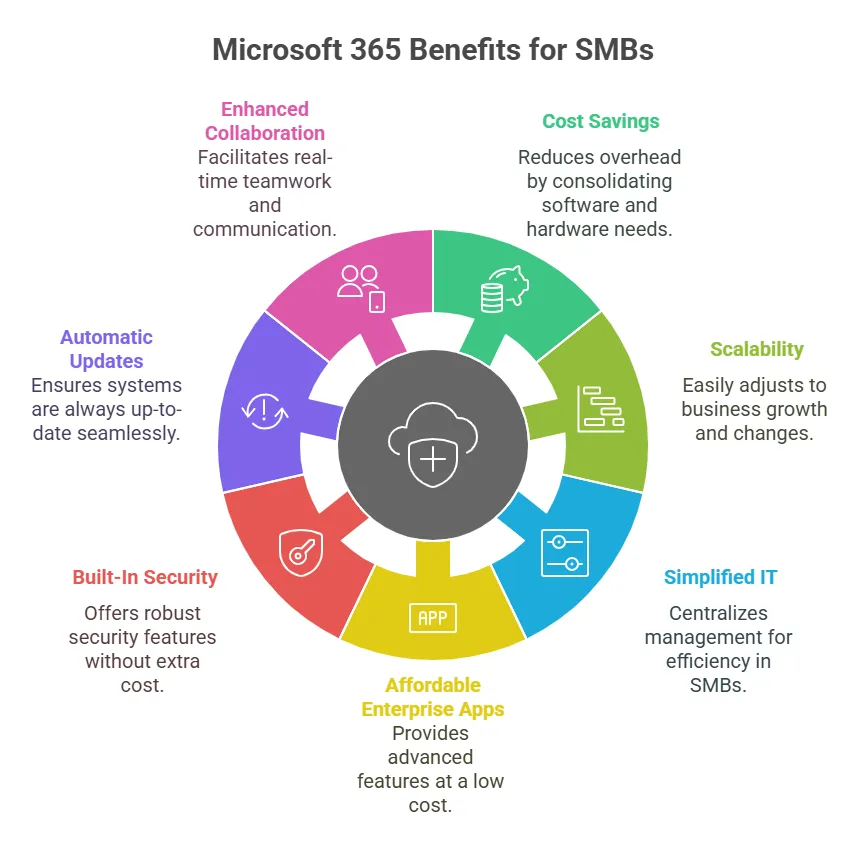You’ve probably heard about cloud-based solutions, but if you’re like many small and mid-sized business leaders, you’re searching for something that delivers real results without overwhelming your team. The good news?
There’s a suite of tools that’s designed to tackle your toughest challenges—like increasing collaboration and locking down your data—while still keeping costs in check. Let’s look deeper at how you can harness these tools to spark innovation, boost productivity, and stay ahead of the competition.
“Learning to use Microsoft 365 can be a major boost for productivity. Instead of relying on an internal server that requires a local connection or use of a VPN, people can collaborate from anywhere in real time.” – Jason Harlam, Business Development Manager, Technology Advisory Group.
What Exactly Is Microsoft 365, and What Does it Include?
Many people still think of Microsoft 365 as just a collection of familiar tools like Word and Excel. However, it’s actually a cloud-powered ecosystem designed to help you run your entire business more efficiently. Formerly known as Office 365, Microsoft 365 combines productivity apps with advanced security, device management, and intelligent cloud services—all under one subscription.
Core Apps and Services You’ll Get:
- Word, Excel, and PowerPoint: The classic productivity suite for creating documents, analyzing data, and designing presentations.
- Outlook: A robust email, calendar, and contacts solution that integrates seamlessly with the rest of the suite.
- Teams: A hub for chat, video conferencing, and file sharing, making real-time collaboration easier than ever.
- SharePoint: Securely store and manage your documents in the cloud, with powerful internal site-building features for team collaboration.
- OneDrive: Your personal cloud storage, ensuring you can access your files from any device, anywhere.
- Power Automate: An automation engine that helps you streamline repetitive tasks and integrate workflows across apps.
- Power Apps: Quickly build custom apps to tackle specific business processes without writing extensive code.
Each app or service within Microsoft 365 complements the others, minimizing the need for third-party tools and reducing costs in the long run. This unified system also receives regular updates at no extra charge, so you’re always running on the latest features—no patch downloads or version management required.
7 Microsoft 365 Benefits for Business
Are you aiming to outpace competitors, strengthen collaboration, and secure your company’s future growth? According to CloudSecureTech, companies that adopt Microsoft 365 can boost team efficiency by 25-35%. Microsoft 365 offers more than just familiar apps—it delivers real-time communication, built-in security, and the flexibility to meet your evolving needs.
1) Slash Overhead Costs: True Cost Savings
We’ve seen SMB teams juggling licenses for multiple software tools – email here, file sharing there. Suddenly, costs soar without offering real synergy. By consolidating most of your daily tasks into one affordable subscription, Microsoft 365 eliminates redundant software expenses. You also save on hardware, since everything runs in the cloud. It’s a pay-as-you-go approach that lowers your overall total cost of ownership (TCO).
2) Scale on Your Terms: Flexibility That Grows with You
Whether you’re onboarding new hires or opening a satellite office, you want a solution that responds quickly. With Microsoft 365, you can add or remove licenses in real time, no waiting for physical servers to be installed. This seamless scalability ensures you’re never overspending on unused capacity or scrambling when business suddenly picks up.
Unlock Your Business Potential with Microsoft 365 |
3) Manage Everything in One Place: Simplify IT Administration
Small and mid-sized businesses often run lean, meaning the CEO might also be the de facto IT person. Microsoft 365’s centralized admin console streamlines user management, security settings, and device configurations under one roof. No more toggling between half a dozen platforms just to set up a new employee’s email or security credentials. You’ll appreciate how smoothly everything fits together when time and resources are stretched thin.
4) Enterprise Apps at SMB-Friendly Prices
In the past, advanced security, compliance, and collaboration features were considered ‘big-company perks.’ Microsoft 365 brings these features to any business size at a predictable monthly rate. Tools like Teams for video conferencing and SharePoint for secure content management are typically found in enterprise-grade solutions, now available and affordable for startups and growing businesses alike.
5) Built-In Security: Get Microsoft’s Best Without the Extra Bill
Cyber threats don’t discriminate based on company size. The cost of a single data breach can be devastating to an SMB. With Microsoft 365, you get built-in security features like data encryption, threat intelligence, and compliance management straight out of the box. Plus, multi-factor authentication and Data Loss Prevention are ready to activate, making it easier to defend your organization without juggling multiple third-party tools. However, it’s important to note that while Microsoft 365 offers robust security capabilities, it’s also a major target for cyberattacks and requires vigilant setup and ongoing management to minimize the risk of a breach.
6) Automatic Updates
If you’ve ever shuddered at the thought of system-wide upgrades, Microsoft 365 eliminates that pain. Updates roll out automatically, ensuring everyone in your organization is on the latest version, with the latest security patches, without the usual disruption. Overworked IT teams can finally breathe a sigh of relief: no more coordinating after-hours patching or trying to force users onto new versions manually.
| Learn More About Optimizing Your Cloud-Based Data |
7) Collaboration Made Easy: A Full-Service Toolkit
Ever lost time emailing file attachments back and forth, waiting on approvals, or chasing updates? Microsoft 365’s integrated suite changes the game with real-time co-authoring in Word, Excel, and PowerPoint, alongside instant messaging and video calls in Teams. Whether your workforce is fully remote, hybrid, or on-site, they’ll collaborate in a single, familiar environment, accelerating decision-making and cutting down on busywork.

Traditional On-Premises vs. Microsoft 365
| Criteria | Traditional On-Premises | Microsoft 365 |
| Collaboration | Limited, often via email or VPN | Real-time tools (Teams, SharePoint) |
| Security & Compliance | Manual updates, higher vulnerability | Built-in, continuously updated, global compliance |
| Scalability | Requires new hardware and complex setup | Annual commitment or monthly premium payment |
| Upfront Costs | Significant capital expenses for hardware & software | Subscription-based, pay-as-you-go model |
| Maintenance | Regular server upkeep and patch management | Automatic updates and support from Microsoft |
| Innovation | Upgrades can be lengthy and disruptive | Seamless release of new features without major downtime |
Struggling to Keep Up? Let TAG Help You Leverage Microsoft 365!
Microsoft 365’s ability to unify collaboration, simplify security, and enable anywhere-access makes it a powerhouse for driving growth in today’s digital landscape. From real-time co-authoring to robust built-in threat protection, you now have a suite of tools that can truly transform your daily operations. And as your business evolves, you can easily scale your subscription, automate repetitive tasks, and always stay ahead with continuous software updates.
Technology Advisory Group (TAG) stands ready to guide you through the migration and integration process as a trusted Managed Service Provider. Contact TAG today to learn more about how Microsoft 365 fits into your cloud strategy and schedule a personalized consultation.
| Leverage Advanced Cloud Migration Services in New England | |
| Massachusetts | Rhode Island |
Schedule Your Cloud Services Consultation
Ready to make a move to the cloud? TAG is ready to help with any or all cloud services from a private cloud, public cloud, or Microsoft 365 services.


